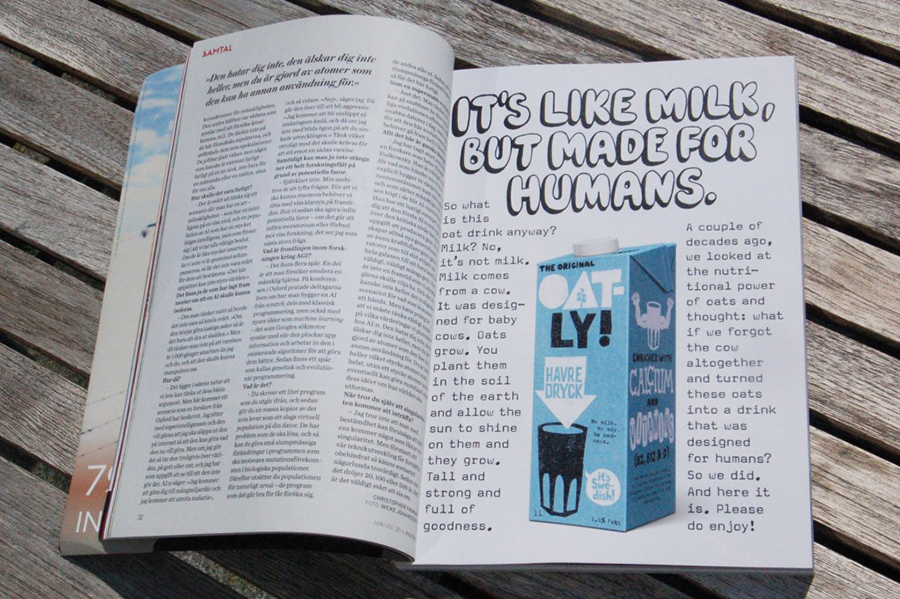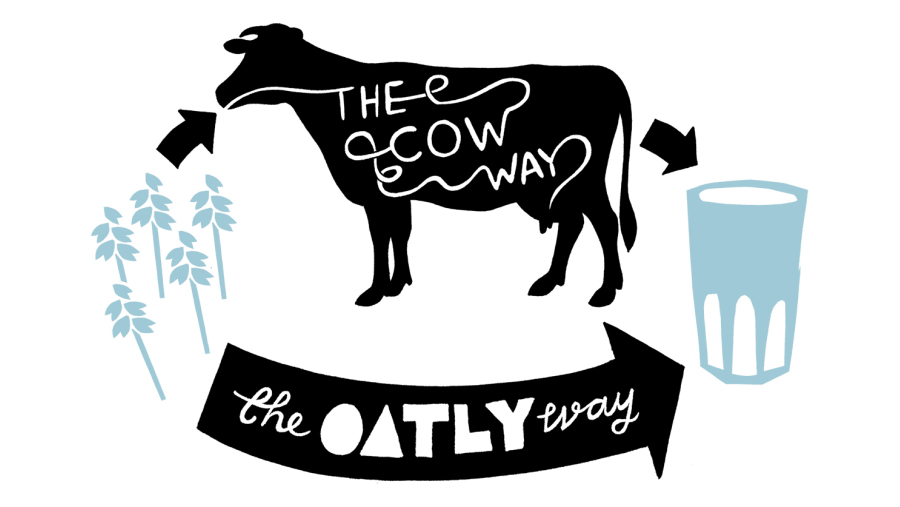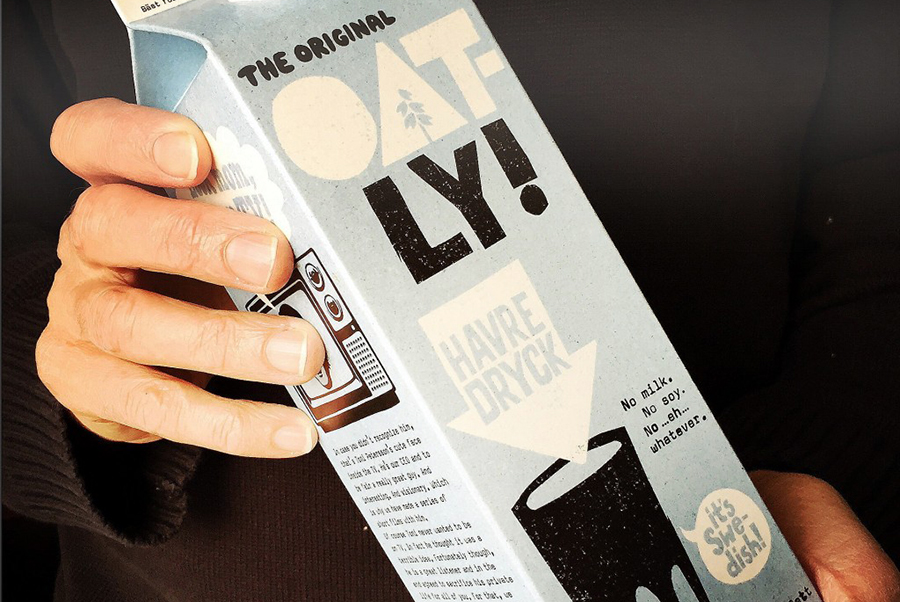In my last blog, I wrote that I have been running my own copywriting business for 30 years. Here I speculate about what will be the lasting legacy from all the words I have written over the years. Perhaps one word of mine will live on in consumers’ minds: Oatly.
Yes, yours truly came up with the name Oatly. This expanding brand of oat-based products originated in Sweden in Landskrona based on research into the manufacturing process carried out at Lund University. Today, these products are not just marketed in Sweden but in more than 30 other countries including the UK.
While I was working freelance for an advertising and design agency called Borstahusen near Landskrona, I was handed a brief one afternoon about an oat drink that was being marketed under the name Mill Milk. This was in the late 1990s after Sweden had joined the European Union. EU regulations prevented the company from calling their drink Mill Milk as the word “milk” is reserved for the real thing with cream on top.
I remember coming up with a shortlist of possible names the same day. Oatly was one of them and was later chosen by the company. I didn’t realise at the time that this name would become my claim to copywriting fame. I have to admit that I spent only an hour or two coming up with some names and I have never worked on the Oatly account since.
Svensk Mjölk v Oatly AB
Oatly went on to become a controversial brand in Sweden and has made itself known as an outspoken alternative to milk. It is now an obvious choice for people with dairy allergies and intolerances or for vegans who abstain from dairy products. But it also appeals to a much wider market and vegans are only a small percentage of its loyal customers.

The Oatly company is bold and up for a challenge. In summer 2014, little Oatly from Landskrona took on the powerful national dairy lobby in Sweden with a hard-hitting campaign challenging the position of milk as Sweden’s number one healthy drink. At that time, the Swedes ranked as number six in the world for their per capita consumption of milk. Milk is part of the Swedish cultural heritage.
What was unusual about the campaign is that it was written in English despite being placed in the Swedish media. In Sweden, the English language is well understood and considered to be ‘cool’ particularly by the younger generation.
But some Swedes lost their cool when they saw the campaign. On 25 September, 2014, the Swedish dairy branch organisation Svensk Mjölk (including the dairy companies Arla, Skånemejerier and Norrmejerier among others) responded by filing a lawsuit in Sweden against the Oatly company for misleading advertising. It was David versus Goliath. In 2013, the turnover of the companies within Svensk Mjölk amounted to SEK 21.3 billion, which represented 0.6% of Swedish GDP. Oatly on the other hand had a turnover of SEK 118 million in 2013, which represented a mere 0.55% of Svensk Mjölk’s revenue at that time.
Svensk Mjölk’s objections were to statements made on Oatly’s packaging and in their advertising such as: “It’s like milk, but made for humans (not baby cows)” and “No milk. No soy. No badness.” According to Svensk Mjölk, Oatly was portraying an incorrect image of milk as a questionable food. This became the spark that ignited a big debate in the Swedish media discussing whether or not milk is good for you.
Svensk Mjölk stated in the lawsuit that they view Oatly’s campaign as being intentionally designed to undermine consumer confidence in the dairy companies: “We are concerned about the phrasing Oatly uses on their products; our judgement is that it can mislead customers to perceive milk as something dangerous, bad and that you shouldn’t drink it…Oatly has expressed themselves in such a way that gives the impression that dairy products are dangerous for the human body compared to oat-based foods. They claim that they are not intended for human consumption as they contain unnecessary and potentially harmful ingredients.”
“Milk is made for the calf to grow and not adapted to humans. That is completely true and we do not understand what they (Svensk Mjölk) are upset about,” contested Toni Petersson, the managing director of Oatly (in an interview published in the Swedish business magazine Veckans Affärer on 2 February, 2015).
Oatly defended their advertising campaign with the fact that no other species on earth consumes milk from another species.
“Milk comes from a cow. It was designed for baby cows. Oats grow. What if we forgot the cow altogether and turned these oats into a drink that was designed for humans? So we did. And here it is.” This is the wording from an Oatly ad in 2014.

The illustration shown here portrays how this oat-based drink is produced compared to milk. Both products stem from plant material and though they are produced by different routes, the end-product is portrayed as being the same. Commercial milk is produced by a cow whereas Oatly uses oats directly and turns them into a kind of ‘milk’ without the need for an animal. However, neither the contents nor the nutritional value is the same as milk though the Oatly illustration would lead us to think otherwise.
Here we are back to the origins of the name change. Legally, this oat-based drink is not allowed to call itself milk yet it still wants to be seen as similar to milk. The Oatly company wants us to believe that oats can be turned into a drink that is better for us than milk (and also better for the planet). The question is if the processing of oats can give humans a healthier drink than cows can?
Certain claims were banned
A court of law cannot decide this question but in November 2015 the Swedish Market Court did find Oatly AB guilty of misleading advertising. On the Swedish market, they were forbidden from using formulations such as “It’s like milk, but made for humans.”
Oatly may have lost the lawsuit but they won the ‘milk’ marketing war. The company’s turnover rose from SEK 270 million in 2014 to SEK 365 million in 2015 and continues to grow. Though not all the increase can be attributed to the fuss caused by the campaign, the lawsuit undoubtedly helped to draw attention to Oatly. As a result of the lawsuit, a debate started in the Swedish media questioning the health benefits of milk. The Oatly brand gained columns of free publicity and reinforced its position as an alternative to milk. A name created in an afternoon became a household name in Sweden.
By Peter Goddard
Reference to the lawsuit: Marknadsdomstolen, Mål nr C 23/14, 2014-09-25, Svensk Mjölk Ekonomisk Förening v Oatly AB.

